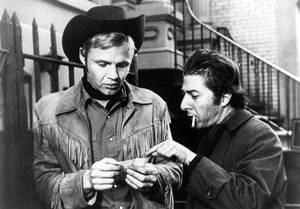
I've been re-arranging the media in my life--books, CDs, DVDs--and I came across a book I bought used in college: Film 69/70: An Anthology by the National Society of Film Critics. There they all were--Arthur Schlesinger, Jr., Andrew Sarris, Stanley Kauffmann, Richard Schickel, John Simon, and of course Pauline Kael--simply and reassuringly working away. I stood in the middle of the mess of words and music and pictures scattered around me and browsed through the collection, watching them going about their business as the '60s slid self-consciously into the '70s, reviewing If ... and The Wild Bunch and Easy Rider and Medium Cool and They Shoot Horses, Don't They?, as well as relative obscurities--at least to me--such as Ivan Passer's Intimate Lighting and Akira Kurosawa's Red Beard, which Kauffmann bemoans as evidence of "a great talent being lavished on hokum," and profiling Barbra Streisand and John Wayne, and reporting on "Fellini at Work" and "The Making of The Angel Levine," not to mention peering at "Skin" --I Am Curious (Yellow) of course and something called Coming Apart, starring (no surprises here) Rip Torn and Sally Kirkland.
As I read, "looking backward," I was driven to an uneasy nostalgia in which my affection for many of these films--and critics--was tempered by remembrance of my insecurities in the face of some of those same movies and critics. By the time I was in college, I fancied myself not merely a film enthusiast but a pretty sharp critic myself. This, as I recall, was most often evidenced by a constant thesis that Aristotle may have been right when he placed "spectacle" low on the list of needful things in theatre, but it was a dead-wrong idea for movies--"Moving PICTURES!" I would triumphantly remind anyone who'd listen--and some who wouldn't, but full steam ahead anyway, right? I always cited 2001 as my proof, which can cause more problems than it solves; but that was the fun of a monomaniacal view of cinema: I had a sharp and certain tool with which to slice away the fat of failed filmmaking. If The Image is not paramount, then the film fails. Case closed.
Such stiffness is self-defeating; every structure needs a little give, or it'll snap. Today, I know that the strength of a movie lies in more than its visuals; and so I can laud The Image without threatening structural integrity, from Carl Dreyer's unblinking study of Jeanne d'Arc's face, to Kane stalking around his newspaper office, almost crushing us down there in that famous hole in the floor from which Gregg Toland recorded all those bangs and whimpers, to, again, any thirty seconds of 2001, to the Mandala swirls of impermanence in Scorsese's Kundun--oh, and so much more; imagine Ozu without his serene, irrational compositions, or Hitchcock without the simple panic of a falling man. Back in 1974, however, my Theory of Everything dug in too stubbornly, and thus was often threatened with defeat. I was enthralled by the spinning imagery of They Shoot Horses, Don't They? and the jump-cuts and subjective camerawork/fantasy sequences of Midnight Cowboy; still, I must admit that I felt insecure around Stefan Kanfer's dismissal of the "assembly line" of "manufactured ironies" in the former and John Simon's assertion of the "ultimate cleverness and sentimentality" of the latter. So maybe I should've stood up to them, asserted my Imagism, damned their faint praise. And I did, sort of, but as time went on and I watched more and more movies--many of them from before 1969/70--I grew uncertain as to whether the movies I had loved in high school were the best I would ever see. Of course they weren't; my uncertainty eventually turned out to be a good thing, but at eighteen I was more dependent on certainty than I wanted to admit. Any doubt was like a sudden coppery taste of blood in the mouth: something's definitely wrong. So I petulantly dismissed the bunch of them, Sarris and Simon, Kauffmann and Kael--which had the effect of giving them too much power over my convictions without allowing myself to take advantage of the doubts they raised. In short, in 1974 Film 69/70 made me too uneasy to read it carefully.
Looking over some of those reviews today and remembering my faltering objections back then, I am relieved that things change, and that I no longer carry the burden--or as much of one--of insecure certainty. Today, those reviews seem clearer to me, some truer, others still wrong; but true because of the critics' own talent to make us see the picture as they did, or wrong because, well, everybody gets to be wrong. Including me.
No comments:
Post a Comment